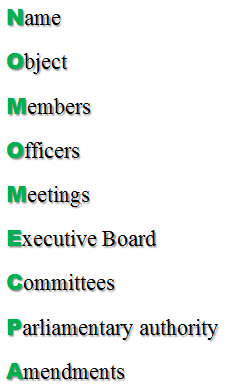Basics of bylaws
Understanding the fundamentals of the purpose of bylaws can help a group move forward more effectively.
Bylaws are the basic rules that an organization adopts to govern it, satisfying the particular needs of the organization. The purpose of bylaws is to determine the rights and duties of membership, to help define how the organization is structured and governed, and to take precedence over the rules in the parliamentary authority. In the past, it was common for an organization to have both bylaws and a constitution. The idea was that the constitution was more important and those rules were made harder to change. These days, most organizations have found that this is cumbersome and unnecessary. Usually all the rules are included in the bylaws with less important ones that the membership wants to be able to change easily created as a list of standing rules according to Robert’s Rules of Order (RONR) (11th ed.), p. 12-14.
Bylaws should follow the order of:

"No Mommy See Pa" (known as NOMOMECPA) is a fun way to remember what is to be included in a standard list of articles in bylaws. The order of articles does indeed make sense. For example, you cannot have officers until you have members, and there must be an organization for those members to join. The memory device is helpful in remembering what the articles are and what order they should be in. Some organizations will have additional articles in their bylaws because of the special nature of the group.
The bylaws should be written in clear language that every member can readily understand. It is important to be sure that there are no rules where the language in one section contradicts the language in another section. This mistake can easily happen if the membership is not very careful when making amendments. The membership should carefully consider precision in word choice sentence structure and punctuation, pay special attention to prevent the consequence of what is omitted carrying as much significance as what is included, document referral to an adjoining section if appropriate and finally remember that temporary or transitional items are not included in bylaws.
Bylaws supersede the rules that are in the parliamentary authority. Since they usually cannot be suspended, they need to be written very carefully and reviewed regularly to be sure that they continue to serve the needs of the organization. Bylaws cannot violate the law, the charter or the bylaws of a superior organization.
When accomplishing the difficult task of amending bylaws, it is not necessary for the entire assembly to make sure the section numbers are consistent throughout the document. Often, one bylaw change causes other necessary changes. This should be noted by the bylaws committee to prevent conflicts from appearing in the final document. It would be wise to adopt a motion to allow the secretary or bylaws committee to make numbering or heading changes that don’t affect the meaning of the amendments but rather help makes the document consistent. Such a motion should be adopted while the bylaw amendments are pending. Only the assembly can amend captions or headings if the changes affect the meaning. Corrections of article or section numbers that cannot result in changes of meaning may be delegated.
The National Association of Parliamentarians offers an online course called Construction of a Successful Organization, which provides an in-depth look at how bylaws create a foundation on which the organization is built. All aspects of bylaws are covered, from the creation of new bylaws to interpretation of existing bylaws, and the relationship of bylaws to an organization’s other governing documents.
The Michigan State University Extension Government and Public Policy team offers training for elected and appointed officials for improved effectiveness in several areas, including various public policy issues and effects of government programs, regulation, incentives, strategies and more. By working together with local elected and appointed officials, and interested citizens, MSU Extension is able to provide education on critical local and state issues.The MSU Extension Government and Public Policy team offers professional training in Parliamentary Procedure and additional resources located at The Parliamentary Procedure Resources Page.



 Print
Print Email
Email


